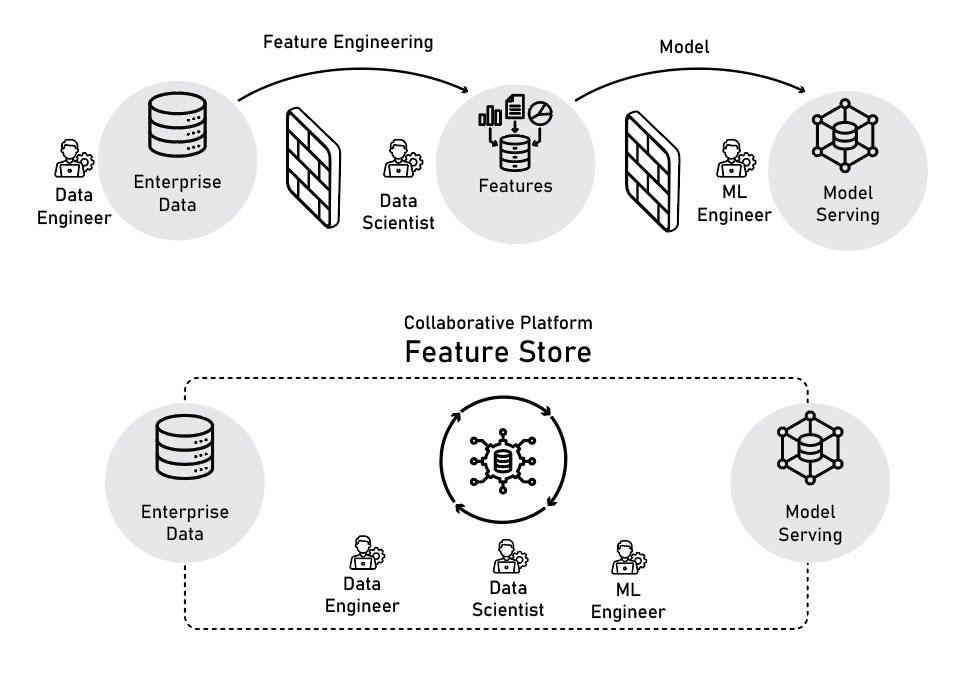August. 2024
The landscape of artificial intelligence (AI) and machine learning (ML) technologies are constantly evolving in every industry. AI/ML models and their applications are also changing rapidly. Managing features (measurable properties or characteristics used in model training) has become difficult.
Yet, many organizations having diverse AI/ML ecosystems struggle to manage their features effectively, often relying on distributed and redundant data pipelines that hinder their AI/ML initiatives. This is where an enterprise feature store comes into the picture, offering a centralized approach to store, manage, and reuse features across different teams and implementation projects.
Let’s explore the challenges of managing features without a centralized feature store and how an enterprise feature store addresses these issues and empowers non-technical users to develop and test ML models more efficiently.
Fragmented Feature Pipelines: A Bottleneck for AI and ML Development
Consider a motor industry where a car is assembled by collecting parts from different suppliers, each with its inventory systems and processes. This becomes a logistical nightmare as without centralized inventory, it becomes challenging to make sure all the parts are in stock, compatible, and up-to-date. This is similar to a challenge many organizations face with feature management in AI and ML projects. When features are managed and stored in isolated pipelines developed by different teams, they often duplicate the efforts, creating inconsistent and redundant pipelines. They struggle to maintain a single source of truth for the enterprise-wide ML models.
For example, in a typical organization, a data scientist may create a set of features for a specific ML model and store them in their local environment. Another data scientist in different team, unaware of these existing features, might develop similar features, leading to redundancy. This wastes valuable time and resources and increases the risk of using inconsistent data in different models, which can lead to conflicting predictions and insights.
The Impact on Collaboration and Scalability
Collaboration between teams becomes a big challenge when you have multiple feature pipelines and fragmented feature management. Data scientists, data engineers, and data analysts often work in silos with their own processes for feature creation and management. This fragmented approach with no unification makes it difficult to share and reuse features across projects, which results in a lack of cohesion and collaboration in AI/ML efforts.
Scalability is another major concern. As organizations grow and their AI/ML projects multiply, managing redundant pipelines of features across multiple teams and environments without a centralized repository becomes increasingly complex. This leads to bottlenecks in the design and development of models. As a result, teams and their projects need more time because they need to constantly create and validate new features every time, rather than leveraging existing ones.
Difficulty in Ensuring Feature Consistency
Consistency is key when it comes to Enterprise Feature Store and management. Features’ quality and consistency directly impact the quality and reliability of AI/ML models. Maintaining consistent feature definitions and ensuring data quality across different projects is nearly impossible without a centralized feature management system. Inconsistent features can lead to models that behave unpredictably, and the results can not be trusted.
Consider a scenario where two teams create slightly different versions of the same feature. One team might include outliers, while the other might apply different preprocessing steps. When you use these features in two different models, the difference in feature engineering approach will lead to varying results for both models. Varied results from different models built on similar features can result in a lack of trust in AI/ML within the organization. A centralized approach to managing features can mitigate this risk by providing a single source of truth for feature definitions. Having central repository for features will ensure that different teams are working on same, high-quality data residing in a governed system.
What is an Enterprise Feature Store?

An enterprise feature store (EFS) is a central repository designed to manage, store, and serve features for machine learning models across an enterprise. It acts as a single source of truth for all feature-related data, ensuring consistency, reusability, and scalability in AI/ML models. The enterprise feature store is built to cater to the needs of large organizations where multiple teams work on various AI/ML projects simultaneously and access similar features from enterprise data. EFS provides a common platform to access and share features; it also helps enhance collaboration and streamlines the development process by reducing duplication.
Core Design Principles of an Enterprise Feature Store
- Centralization: The foundation of an enterprise feature store is centralization. In EFS, all the feature data is consolidated in one place to make it accessible to all teams within the organization. The centralized approach of feature management eliminates the redundancy in ML pipelines and it also ensures that every team is working on the same version of features for their AI/ML models.
- Reusability: Enterprise feature stores bring a massive benefit of feature reuse and significantly reduce the effort required to develop models. The feature is created only once; other teams can reuse it without reinventing the wheel. This approach saves the project teams time and effort and ensures that everyone in the organization is working on the same high-quality features.
- Consistency and Quality Assurance: The enterprise feature stores enforce consistency in feature definitions, feature development processes and data quality. EFS maintains a single source of truth and helps ensure that all teams are using the same verified features. Consistent and high-quality features are essential to develop reliable and accurate models.
- Security and Access Control: In large organizations, data security and access control are critical. Enterprise feature store includes robust security features that allow organizations to control who can access, modify, or use specific features without creating silos for each team based on their business domains. Sensitive data can be protected without impacting collaboration by implementing role-based access.
Core Features of a Centralized Feature Store
- Feature Cataloging and Discovery: The Enterprise feature store approach also provides a comprehensive cataloging feature for all available features. Feature catalog makes it very easy for the teams to discover and use features without consulting the team members who worked on creating those features . The feature catalog contains metadata, including business description, creation date, user who created it, usage history, and other important information about each feature. The rich metadata associated with each feature enables easy search and discovery.
- Version Control and Lineage Tracking: Just like code, features evolve over time. A well-designed feature store includes version control and lineage tracking. These capabilities allow teams to track changes and updates to features over time and understand how they were created. This is essential for the explainability of AI/ML models, debugging models during the model development process, and ensuring that the correct version of a feature is used.
- Real-Time Feature Serving: Many AI/ML models like fraud detection in financial industry require real-time features that are updated frequently. The enterprise feature store supports real-time feature serving, allowing AI/ML models to access real-time data. This is important for applications like predictive maintenance, fraud detection, or personalized recommendations, where real-time data is required for inference.
- Observability and Governance: It is important for AI/ML applications that the features are being used correctly and that the data is of high quality because AI/ML models are simply Garbage in garbage out (GIGO) without having any intelligence outside the scope of provided data. Monitoring and governance capabilities are part of the enterprise feature store to ensure that high-quality data is maintained. These capabilities also allow organizations to track how features are being used, identify potential issues, and enforce best practices.
Benefits of an Enterprise Feature Store Over Redundant Feature Pipelines
Eliminating Redundancy and Inconsistency
The most significant benefit of an enterprise feature store is the ability to eliminate redundancy and inconsistency in features. Feature duplication and duplication of efforts for creating features is significantly reduced when all the features are managed in a centralized repository. Teams no longer need to recreate the same features repeatedly for each project, reducing the risk of inconsistencies and errors. This centralized approach of feature management ensures that all models are built on a foundation of consistent, high-quality features which eventually leads to more accurate and reliable outcomes.
Accelerating Time-to-Model with Reusable Features
The ability to reuse features across multiple projects significantly accelerates the time required to develop the AI/ML models. In most cases, teams avoid various steps in the early stages of model development like exploratory data analysis, feature engineering, and data pre-processing. Data scientists and engineers can leverage existing features from the enterprise feature store which reduces the significant time. Teams can focus more on model development and tuning, which can improve the quality of the model and ultimately speed up the entire ML lifecycle. For example, a feature created for a customer segmentation model can be reused in a recommendation engine, saving time and resources.
Enhancing Collaboration Across Teams
An enterprise feature store fosters collaboration across teams by providing a centralized platform for feature management. Different teams in an organization can share and discover features very easily as EFS helps break down silos and enable cross-functional collaboration. Data scientists, engineers, and business analysts can all contribute to and benefit from the feature store. This is how they create a more integrated and efficient AI/ML workflow. This collaborative environment leads to more innovative solutions, better overall outcomes and faster time to market.
Improved Model Performance and Reliability
Consistency in feature management directly translates to improved model performance and reliability. When built using well-defined, high-quality features from a centralized store, models are more likely to produce accurate and reliable predictions. The governance and monitoring capabilities provided by feature store management tools like Feast, Tecton, or Hopsworks help maintain the quality of features over time, ensuring that models continue to perform well as they are updated or retrained.
Enabling Self-Service AI with Low-Code/No-Code Tools
The Role of Low-Code/No-Code Platforms in Democratizing AI
Low-code and no-code platforms for AI/ML development can catalyze AI’s democratization in any organization. These platforms enable users to create and deploy machine learning models without having the required technical background and skills. They offer intuitive drag-and-drop interfaces that abstract the complexities of coding and allow business analysts, domain experts, and other non-technical stakeholders to do quick experimentation and participate in AI/ML initiatives. However, these tools are not capitalized to their full potential because they are unavailable for well-defined, easily accessible, high-quality features. An enterprise feature store is uniquely positioned to bridge this gap.
Bridging the Gap: How an Enterprise Feature Store Facilitates Self-Service AI
An enterprise feature store is crucial in enabling self-service AI in organizations. Tech-savvy organizations have achieved a maturity level where data analytics have been democratized, and they have enabled their team to do self-service business intelligence for informed decision-making. Some of them are struggling to provide self-service AI. Enterprise feature store is essential to achieve this as it allows for a centralized repository of ready-to-use features. These features are curated, preprocessed, validated and refreshed as per need. This is how EFS makes the core ingredients of AI/ML models accessible to users with limited technical expertise. Non-technical users can quickly find and leverage the features they need to build and test models without having to worry about data wrangling or feature engineering if they have access to the enterprise feature store.
For instance, a marketing team is looking to build a predictive model to identify potential high-value customers. They can easily pull features such as purchase history, customer demographics, and Customer application engagement metrics from the feature store using any low/no-code platform. This will allow them to experiment with different models and strategies without needing deep data engineering skills. Effective use of these platforms and EFS can accelerate their ability to generate insights and take action right in time.
Conclusion: The Future of AI and ML with Enterprise Feature Stores
The adoption of this concept (enterprise feature store) is swiftly emerging as a best practice for organizations aiming to scale their AI and ML initiatives effectively. An enterprise feature store not only simplifies the AI/ML development process but also empowers a wider range of users to contribute meaningfully to these efforts. Enterprise fetaure store also brings agility and enhanced governance by centralizing feature management, minimizing redundancy, and fostering collaboration across teams.
AI is rapidly evolving and deeply embedded in business operations in every industry vertical. The role of enterprise feature store will only become more critical and will open new avenues of AI maturity in organizations. Organizations will be better equipped to innovate, adapt to market shifts, and sustain a competitive advantage if they invest in initiatives like enterprise feature stores and democratize AI across different teams instead of keeping the innovation potential limited to one team. For those seeking to maximize the impact of their AI and ML projects, embracing an enterprise feature store is no longer merely an option—it is a strategic necessity.

Muhammad Awais Ejaz
Awais is the Consulting Director, Data Analytics at TenX
Global Presence
TenX drives innovation with AI consulting, blending data analytics, software engineering, and cloud services.
Ready to discuss your project?






